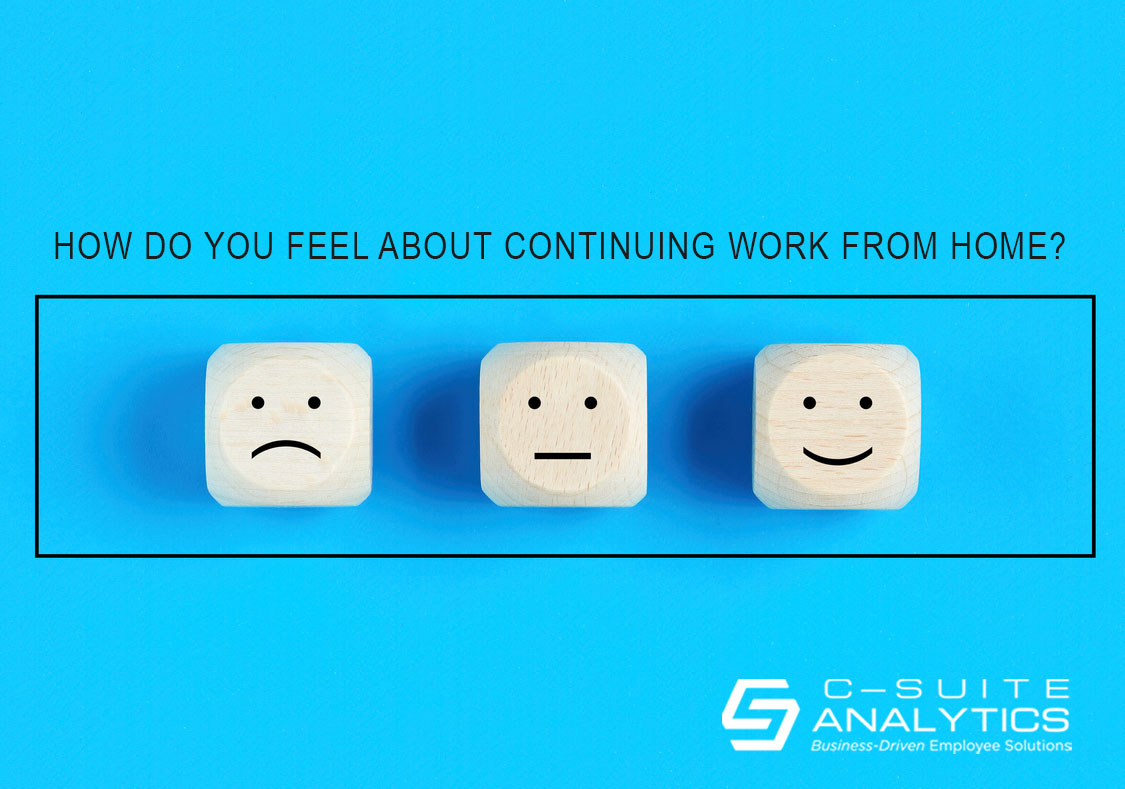Most hiring tools answer whether candidates can and will do the job, but not if they’ll stay. Learn how realistic job previews and motivational-fit interviews can improve retention from day one.
The Truth About Who Will Work From Home

Covid-19 has gifted us with work-from-home mania, the new and popular chit-chat topic at home and at work…or simultaneously in both places because for many, home and work are now the same address. First, let’s get some facts on the table. And we’ll put them on the dining room table because that’s where many of us now spend our mornings and afternoons.
- Pre-pandemic, 7% of U.S. workers did their work from home[i]
- University of Chicago researchers found 37% of all U.S. jobs could potentially be done from home,[ii] meaning about two-thirds of our total U.S. jobs are outside of work-from-home consideration.
- The most famous work-from-home buster was a working mom.
That disruption happened in 2013 when then-Yahoo CEO Marissa Mayer declared shortly after taking office that all who worked from home would return to headquarters, saying “Some of the best decisions and insights come from hallway and cafeteria discussions, meeting new people, and impromptu team meetings. We need to become one Yahoo!”[iii]
I’ve been tracking work-from-home surveys since the pandemic began, and the summary trendline is the longer time goes on, the less happy most people are with work from home. And everyone includes executives, managers, and employees.
But another important fact is this pandemic-driven work-from-home experience is not a legitimate try but rather an imposed one. We are experiencing “shelter-in-place-work-from-home”. Let’s convert that into a new acronym: SIPWFH.
So, one could say many of the newfound opinions regarding SIPWFH are as artificial as our make-shift desks. Or that dining room table we share with our kids as long as they are in an artificial school environment, too. No one planned for this, just as we didn’t plan to wear masks in the drug store.
The ultimate decision-makers on who will work from home are our CEOs. And the Wall Street Journal just polled a bunch of them to learn their opinions.[iv] I’ll share some of those opinions here along with the company names:
- Netflix: “I don’t see any positives.”
- BlackRock: “I don’t believe BlackRock will ever be 100% back in office.”
- Chief Robotics: “We tried it. It’s just not the same.”
- JP Morgan Chase: “I think going back to work is a good thing.”
- Apple: “I can’t wait for everybody to be able to come back into the office.”
- Herman Miller: “That unplanned kind of interaction that contributes so much to how we build relationships with people and how we build culture, those things are what are missing.”
- Stifel Financial Corp: “I am concerned that we would somehow believe that we can basically take kids from college, put them in front of Zoom, and think that three years from now, they’ll be every bit as productive as they would have had they had the personal interaction.”
- Rite Aid: “We have adapted to work-from-home unbelievably well.”
- Microsoft: “We’re realizing that some people would rather have workspace at work once the Covid-19 crisis goes away because they want dedicated workspace with good network connectivity.”
- Facebook: “I think we’re going to be the most forward-leaning company on remote work at our scale.”
- Waste Management: “Most of us are not hermits…We need that social interaction, not only from a business standpoint but truly from a kind of personal-development standpoint.”
- Carbon Inc: “What I worry about the most is innovation. Innovation is hard to schedule—it’s impossible to schedule.”
- Marriott: “It’s a much harder way to work for anything that requires a personal relationship.”
This is a small sample for sure, but the results read as though the absence of personal interaction will weigh down on problem solving and creativity. And I will add that it is hard to build the personal level of trust that is required for true engagement and retention without those in-person interactions that cover subjects like how little Joanie’s little league game was last night.
Or those big subjects like What are you learning here? which is the second of our five Stay Interview questions.
Many variables will contribute to the ultimate percentage of U.S. workers who work from home like how soon we move past this pandemic if ever, how many employees will feel safe returning to work, and how many employees will demand that they work from home even if they have to change jobs to do so. But it looks like CEOs will have the biggest vote.
What’s your preference? Would you prefer working from home, working in the office, or some mixed schedule? Please email me if you will to tell me your answer and why.
Please email your comments to me at DFinnegan@C-SuiteAnalytics.com. You are also welcome to forward this blog to anyone you believe would find it helpful.
[i] https://www.shrm.org/hr-today/news/hr-news/Pages/Remote-Workers-Experiencing-Burnout.aspx?utm_source=marketo&utm_medium=email&utm_campaign=editorial~Talent~NL_2020-6-3_Talent-Acquisition&linktext=Remote-Workers-Are-Experiencing-Burnout&mkt_tok=eyJpIjoiTldNM09HUTJOekU0TVRKayIsInQiOiI5NzVmZk9BTWlwdmhpa2UyNmtSMTJ1dFNFZEhJQk0wczIrNnorWFwvcFM0T0JFM0czbEkrYjdDOWZCNW1ZYk81TU9mZnN0WlFaZ0ZJQzl5bmlqaXZGS21ZSXBsZVFJWTRyTTArVEVWRU84S1pIY1I1KzErTUZiOWNNXC9kV24zV3l3In0%3D
[ii] https://brentneiman.com/research/DN.pdf
[iii] https://www.forbes.com/sites/jennagoudreau/2013/02/25/back-to-the-stone-age-new-yahoo-ceo-marissa-mayer-bans-working-from-home/#57ced3c41667
[iv] https://www.wsj.com/articles/what-ceos-really-think-about-remote-work-11600853405?mod=hp_lead_pos11



